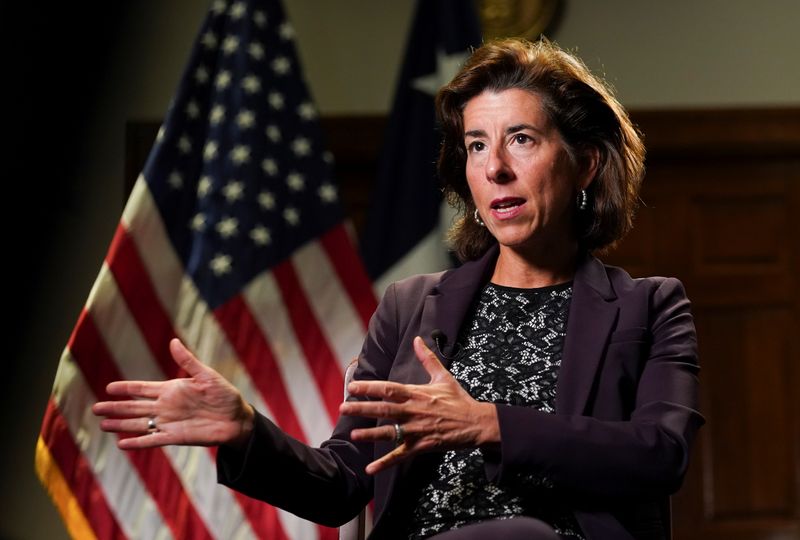
- All Instrument Types
- Indices
- Equities
- ETFs
- Funds
- Commodities
- Currencies
- Crypto
- Bonds
- Certificates
Please try another search

U.S. Commerce chief: 'Aggressive' action on chip shortage needed
 © Reuters. U.S. Commerce Secretary Gina Raimondo speaks during a Reuters interview at the Department of Commerce in Washington U.S., September 23, 2021. REUTERS/Kevin Lamarque
© Reuters. U.S. Commerce Secretary Gina Raimondo speaks during a Reuters interview at the Department of Commerce in Washington U.S., September 23, 2021. REUTERS/Kevin Lamarque
By David Shepardson
WASHINGTON (Reuters) -U.S. Commerce Secretary Gina Raimondo said on Thursday it is time to get "aggressive" in addressing the worsening semiconductor chip shortage that has caused automakers and others to cut production and impacted thousands of U.S. workers.
"It’s time to get more aggressive. The situation is not getting better, in some ways it is getting worse,” Raimondo told Reuters in an interview. She said a voluntary request for information issued on chips to industry this week "will give us more information about the supply chain, and the goal is to increase transparency so we can try to identify where the bottlenecks (are) and then predict challenges."
She warned if companies did not answer the voluntary request "then we have other tools in our tool box that require them to give us data. I hope we don't get there. But if we have to we will."
The White House was hosting a pair of virtual meetings on semiconductors on Thursday
Automakers from General Motors Co (NYSE:GM) to Toyota Motor (NYSE:TM) Corp have slashed output and sales forecasts due to scarce chip supplies, made worse by a COVID-19 resurgence in key Asian semiconductor production hubs.
"Realistically, there is no quick and easy fix," Raimondo said. "We are going to be dealing with this well into next year."
In June, the Senate voted to approve $52 billion to boost U.S. semiconductor production.
"Fundamentally the solution is that we need to make more chips, and we need to make more chips in America, which is why the House can't pass the Chips Act fast enough, as far as I am concerned. We need the money, we need to make more chips," Raimondo said.
She added that she was "optimistic that we could make some incremental progress in the next handful of months" by boosting supply-chain transparency. "There's a lack of trust in the supply chain. There's probably some over-ordering going on, you know. There might be some ... suppliers sending chips here because they can make more money, instead of here."
Companies attending the virtual White House meetings include Detroit's Big Three automakers, plus Apple Inc (NASDAQ:AAPL), Daimler AG (DE:DAIGn), BMW AG, GlobalFoundries, Micron (NASDAQ:MU), Microsoft Corp (NASDAQ:MSFT), Samsung (KS:005930), TSMC and Intel Corp (NASDAQ:INTC).
A group representing major automakers said the industry and semiconductor companies are "working diligently to resolve the global chip shortage as quickly and efficiently as possible ... and to strengthen transparency and resiliency in the automotive semiconductor supply chain."
Related Articles
Are you sure you want to block %USER_NAME%?
By doing so, you and %USER_NAME% will not be able to see any of each other's Investing.com's posts.
%USER_NAME% was successfully added to your Block List
Since you’ve just unblocked this person, you must wait 48 hours before renewing the block.
I feel that this comment is:
Thank You!
Your report has been sent to our moderators for review






Add a Comment
We encourage you to use comments to engage with other users, share your perspective and ask questions of authors and each other. However, in order to maintain the high level of discourse we’ve all come to value and expect, please keep the following criteria in mind:
Enrich the conversation, don’t trash it.
Stay focused and on track. Only post material that’s relevant to the topic being discussed.
Be respectful. Even negative opinions can be framed positively and diplomatically. Avoid profanity, slander or personal attacks directed at an author or another user. Racism, sexism and other forms of discrimination will not be tolerated.
Perpetrators of spam or abuse will be deleted from the site and prohibited from future registration at Investing.com’s discretion.